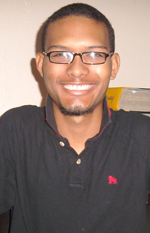Economist flags ‘reckless spending’ on infrastructural projects
Apr 13, 2022 -- Source --- Kaieteur News Online --- https://www.kaieteurnewsonline...structural-projects/
– urges stepped-up scrutiny of Amaila Falls
Kaieteur News – The current public investment climate in Guyana is worrying to Economist, Elson Low, who believes that the reckless spending of the administration must not be allowed to easily slip by.
In fact, Low believes that one does not need a microscope to see the wrong decisions the government has been making when it comes to spending from the public purse, as several decisions to invest in various infrastructural projects remain controversial. One such example, according to the Economist, is the Amaila Falls Hydropower project.
Although the government will not be investing into the project with upfront costs, Guyanese will have to carry the burden of that project, and after 20 years, the ownership would be transferred to Guyana from the Chinese contractor, China Railway First Group.
Economist, Elson Low
The 165 megawatt (MW) project is pegged at US$700 million. It is being pursued under a Build Own Operate Transfer (BOOT) model, in which Guyana would be buying electricity from the hydro project at an estimated cost of about 7.7 cents per MW.
However, at the recent International Energy Conference and Expo, hosted in Guyana, Head of the Guyana Energy Agency (GEA), Dr. Mahender Sharma has indicated that Guyana currently receives enough sunshine every two hours, to power the country’s present electricity demands for an entire year.
To this end, some analysts hold the view that investing in solar power may have been the cheaper, more reliable route for Guyana. In this regard, Elson Low, who holds a Bachelor’s Degree in political Science and Economics from a United States College, Amherst said, that the government’s spending on large infrastructural projects must be subject to proper scrutiny.
“People often say that you can’t eat roads but what I would do is be a bit more specific to say that we have in this country a history of poorly executing our large national infrastructure projects, and so I think that those need to be subject to much more scrutiny. I have spoken at length about the Amaila Falls and even using the government’s own estimates for other projects, solar projects, you could generate the same amount of electricity for almost half the cost so Amaila is an example of really really poor planning by the government and a very poor project,” the Economist told this publication in an exclusive interview.
Low added that the Amaila Falls project is one in particular which, if not properly managed, will not result in the type of benefits it could have, especially if Guyana were to be more efficient in the way it invested. He signaled, “So as a result, you will see a lot of spending, but not a whole lot of benefit to the population, if we have that type of poorly planned infrastructural projects by the government.”
The financial analyst also observed that the price of numerous government projects remain questionably high, even though the government said it reduced and removed taxes on some building materials. “Yes, the government has reduced taxes on construction materials and so on but if we have procurement fraud which will be an inflation of the prices, it doesn’t really matter if the government has reduced its taxes, those prices will be high anyway and will go into the pockets of corrupt officials,” he explained.
In this regard, he urged that the public be vigilant when it comes to identifying possible inflated contract sums and demand that same be investigated for procurement fraud.
He said, “I believe that any project which raises red flags should automatically be investigated for procurement fraud. That is not to say that I believe that these projects are engaged in procurement fraud but that when you see something where the cost seems beyond reasonable expectations, we should enquire what the facts are so that we can prevent procurement fraud, which is estimated to be a significant problem in Guyana by many agencies.”
On this note, Low pointed out that the Public Procurement Commission (PPC) is also yet to be established. That body is tasked with ensuring the integrity in the procurement process. In the absence of such an institution, the Economist drove home his point on the importance of the public keeping a watchful eye on price tags of projects to be funded by the national coffers.
On the other hand, he also argued that the “high-priced” projects many times are constructed so poorly that they require attention and remedial work within days of completion.
For instance, Low pointed to the University of Guyana (UG) access road which was being rehabilitated by Yunas Civil and Building Construction to the tune of $275.5 million. He argued that days after the road was completed, evidence of the road sinking was demonstrated, accompanied by a large pot hole.
He said, “It is not satisfactory that they came and patched the road, we need to have proper police investigations into all of these things so that we can know what is going on…what I think that it shows, is that, that is once again an instance where that particular contract needs to be investigated so that the facts can come out, and we can identify whether or not there is procurement fraud. It is well understood that no road should develop pot holes or other such defects only a short while after it is constructed.”


